Project Report: Analysis of Crowd-funded Event for GSM London
VerifiedAdded on 2020/07/22
|17
|8554
|56
Report
AI Summary
This project report analyzes a crowd-funded event proposed for GSM London, as part of a Project/Placement Design and Implementation module. The assignment requires students to pitch their event idea to the GSM London’s External Engagement Lead. The report involves completing a learning contract, analyzing the project's background, applying trans-disciplinary models, assessing project phases, discussing developed skills, evaluating actions taken, and providing a portfolio of evidence. The report is assessed on knowledge and understanding, intellectual and cognitive skills, and graduate skills, including written, oral, and presentation skills. The student is expected to demonstrate critical thinking, problem-solving, and application of relevant theories to provide recommendations for the project. The report should be well-structured, analytical, and supported by secondary research and organizational data, with proper referencing and appendices.
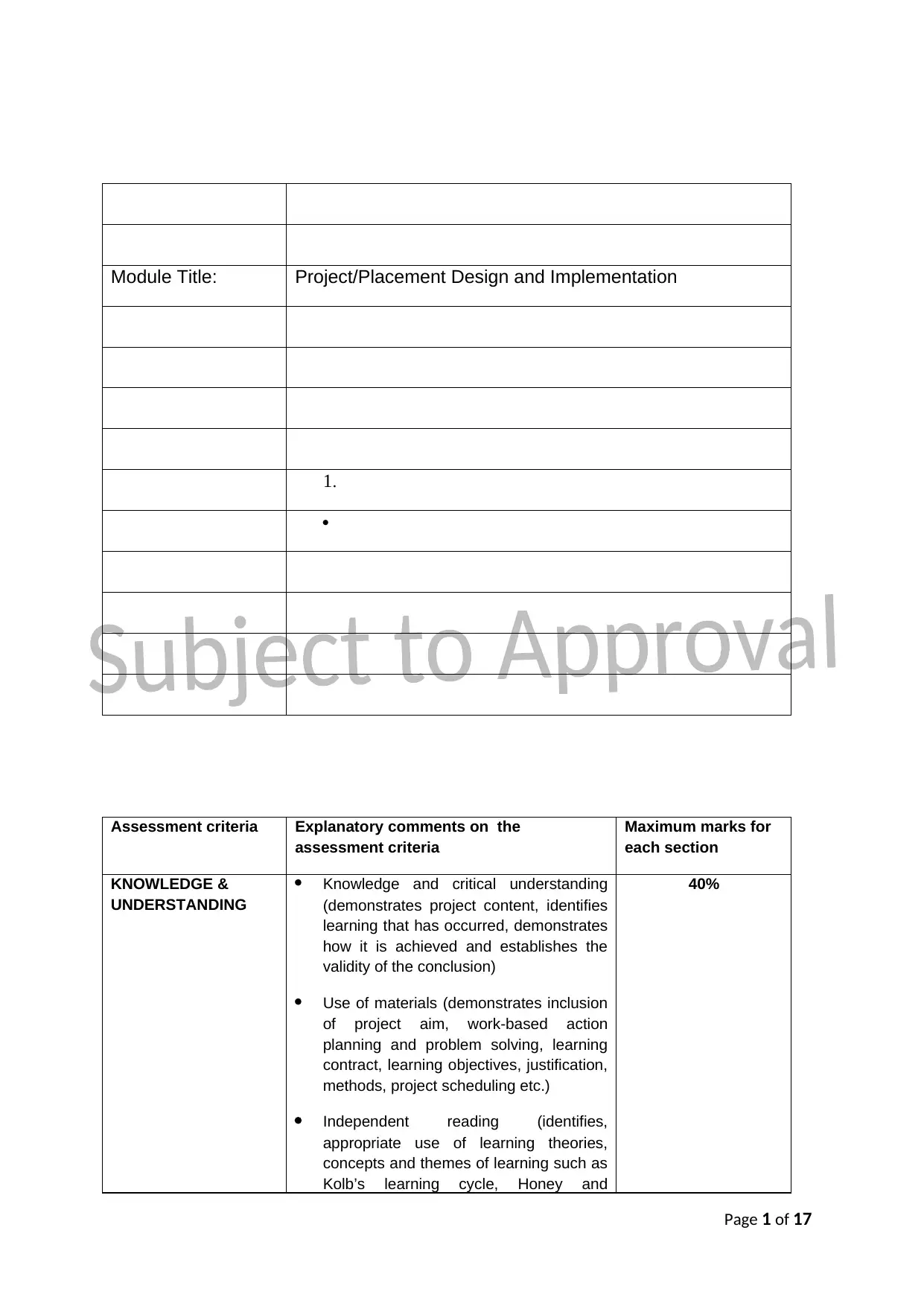
Module Title: Project/Placement Design and Implementation
1.
Assessment criteria Explanatory comments on the
assessment criteria
Maximum marks for
each section
KNOWLEDGE &
UNDERSTANDING
Knowledge and critical understanding
(demonstrates project content, identifies
learning that has occurred, demonstrates
how it is achieved and establishes the
validity of the conclusion)
Use of materials (demonstrates inclusion
of project aim, work-based action
planning and problem solving, learning
contract, learning objectives, justification,
methods, project scheduling etc.)
Independent reading (identifies,
appropriate use of learning theories,
concepts and themes of learning such as
Kolb’s learning cycle, Honey and
40%
Page 1 of 17
1.
Assessment criteria Explanatory comments on the
assessment criteria
Maximum marks for
each section
KNOWLEDGE &
UNDERSTANDING
Knowledge and critical understanding
(demonstrates project content, identifies
learning that has occurred, demonstrates
how it is achieved and establishes the
validity of the conclusion)
Use of materials (demonstrates inclusion
of project aim, work-based action
planning and problem solving, learning
contract, learning objectives, justification,
methods, project scheduling etc.)
Independent reading (identifies,
appropriate use of learning theories,
concepts and themes of learning such as
Kolb’s learning cycle, Honey and
40%
Page 1 of 17
Paraphrase This Document
Need a fresh take? Get an instant paraphrase of this document with our AI Paraphraser
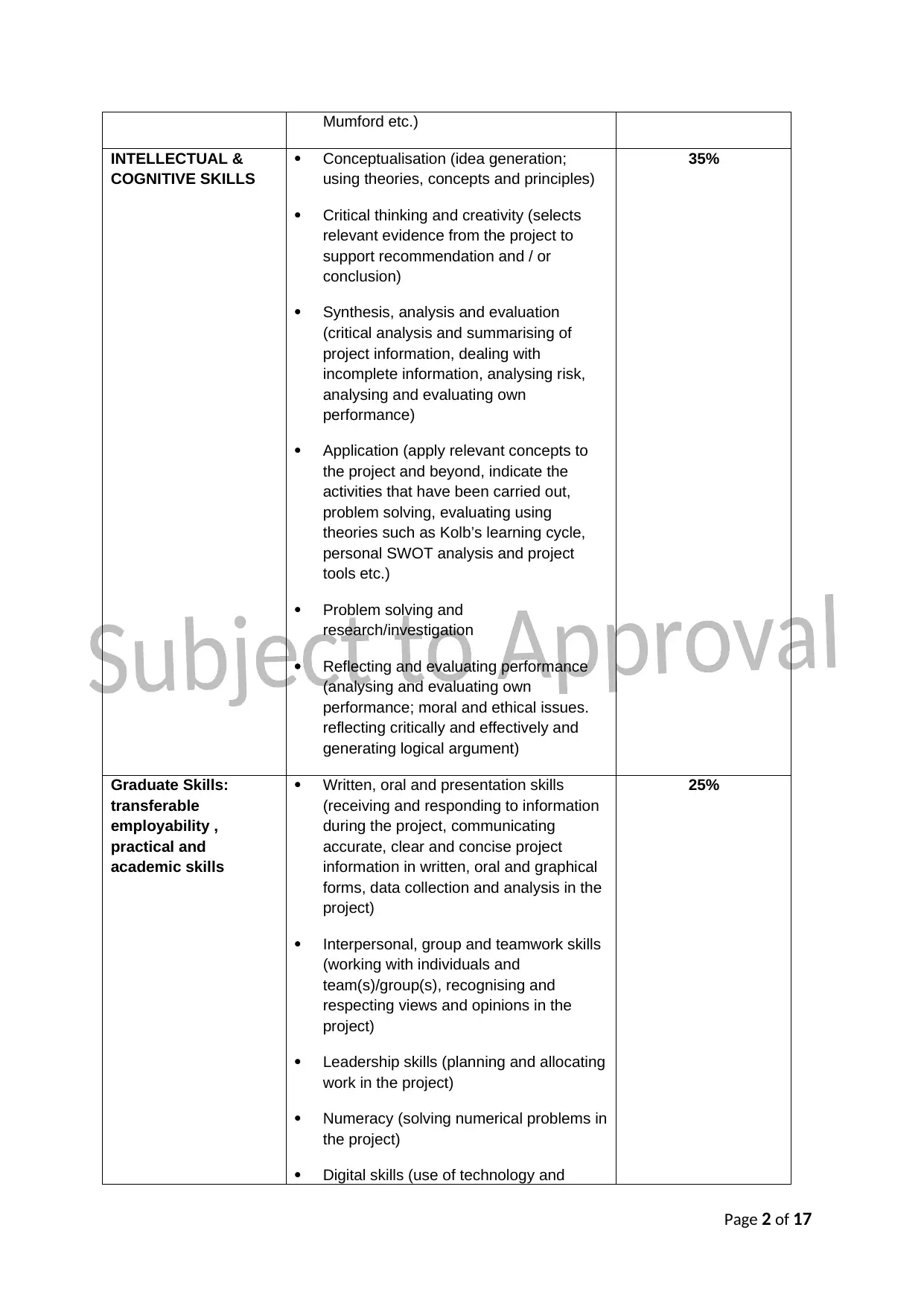
Mumford etc.)
INTELLECTUAL &
COGNITIVE SKILLS
Conceptualisation (idea generation;
using theories, concepts and principles)
Critical thinking and creativity (selects
relevant evidence from the project to
support recommendation and / or
conclusion)
Synthesis, analysis and evaluation
(critical analysis and summarising of
project information, dealing with
incomplete information, analysing risk,
analysing and evaluating own
performance)
Application (apply relevant concepts to
the project and beyond, indicate the
activities that have been carried out,
problem solving, evaluating using
theories such as Kolb’s learning cycle,
personal SWOT analysis and project
tools etc.)
Problem solving and
research/investigation
Reflecting and evaluating performance
(analysing and evaluating own
performance; moral and ethical issues.
reflecting critically and effectively and
generating logical argument)
35%
Graduate Skills:
transferable
employability ,
practical and
academic skills
Written, oral and presentation skills
(receiving and responding to information
during the project, communicating
accurate, clear and concise project
information in written, oral and graphical
forms, data collection and analysis in the
project)
Interpersonal, group and teamwork skills
(working with individuals and
team(s)/group(s), recognising and
respecting views and opinions in the
project)
Leadership skills (planning and allocating
work in the project)
Numeracy (solving numerical problems in
the project)
Digital skills (use of technology and
25%
Page 2 of 17
INTELLECTUAL &
COGNITIVE SKILLS
Conceptualisation (idea generation;
using theories, concepts and principles)
Critical thinking and creativity (selects
relevant evidence from the project to
support recommendation and / or
conclusion)
Synthesis, analysis and evaluation
(critical analysis and summarising of
project information, dealing with
incomplete information, analysing risk,
analysing and evaluating own
performance)
Application (apply relevant concepts to
the project and beyond, indicate the
activities that have been carried out,
problem solving, evaluating using
theories such as Kolb’s learning cycle,
personal SWOT analysis and project
tools etc.)
Problem solving and
research/investigation
Reflecting and evaluating performance
(analysing and evaluating own
performance; moral and ethical issues.
reflecting critically and effectively and
generating logical argument)
35%
Graduate Skills:
transferable
employability ,
practical and
academic skills
Written, oral and presentation skills
(receiving and responding to information
during the project, communicating
accurate, clear and concise project
information in written, oral and graphical
forms, data collection and analysis in the
project)
Interpersonal, group and teamwork skills
(working with individuals and
team(s)/group(s), recognising and
respecting views and opinions in the
project)
Leadership skills (planning and allocating
work in the project)
Numeracy (solving numerical problems in
the project)
Digital skills (use of technology and
25%
Page 2 of 17
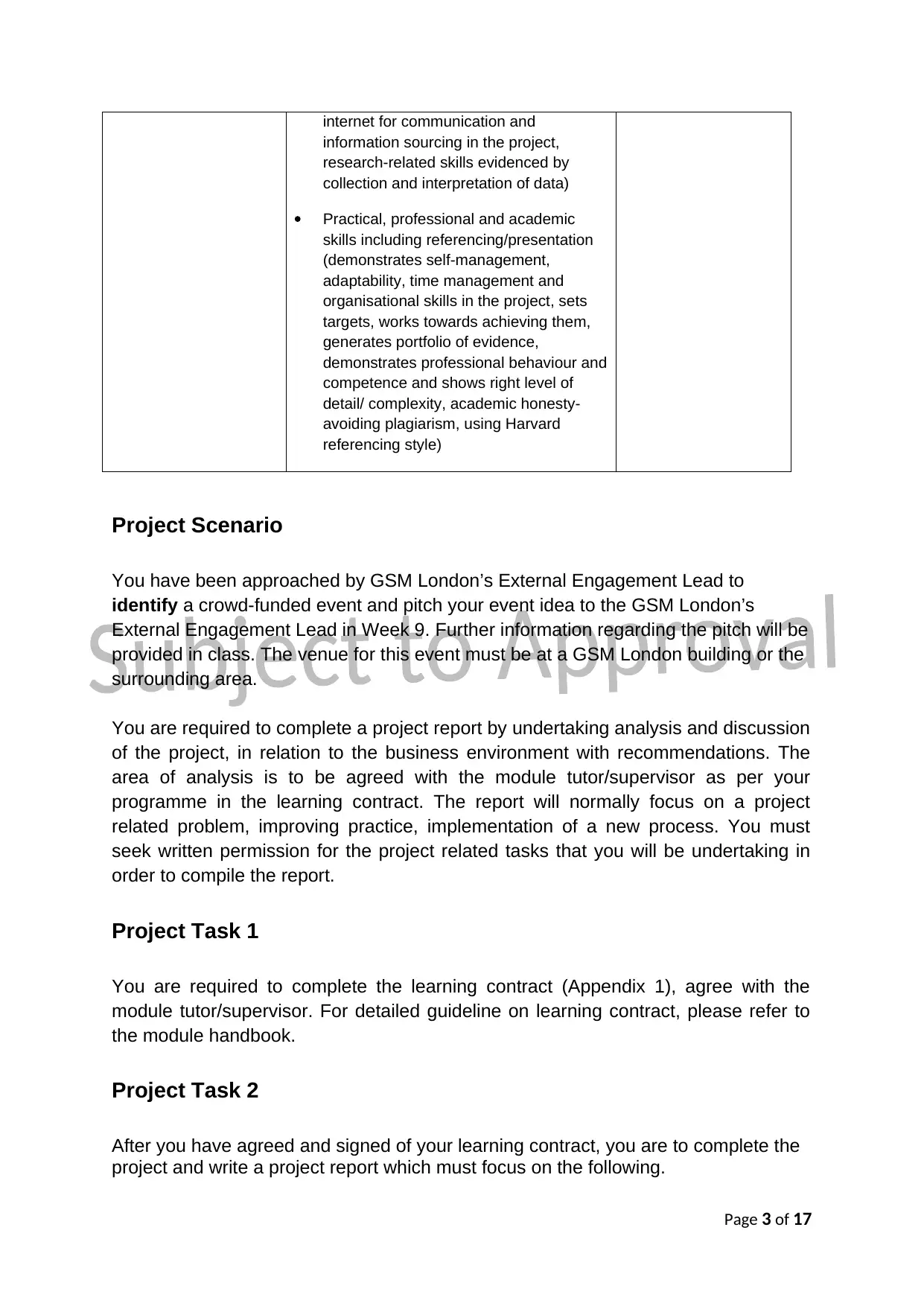
internet for communication and
information sourcing in the project,
research-related skills evidenced by
collection and interpretation of data)
Practical, professional and academic
skills including referencing/presentation
(demonstrates self-management,
adaptability, time management and
organisational skills in the project, sets
targets, works towards achieving them,
generates portfolio of evidence,
demonstrates professional behaviour and
competence and shows right level of
detail/ complexity, academic honesty-
avoiding plagiarism, using Harvard
referencing style)
Project Scenario
You have been approached by GSM London’s External Engagement Lead to
identify a crowd-funded event and pitch your event idea to the GSM London’s
External Engagement Lead in Week 9. Further information regarding the pitch will be
provided in class. The venue for this event must be at a GSM London building or the
surrounding area.
You are required to complete a project report by undertaking analysis and discussion
of the project, in relation to the business environment with recommendations. The
area of analysis is to be agreed with the module tutor/supervisor as per your
programme in the learning contract. The report will normally focus on a project
related problem, improving practice, implementation of a new process. You must
seek written permission for the project related tasks that you will be undertaking in
order to compile the report.
Project Task 1
You are required to complete the learning contract (Appendix 1), agree with the
module tutor/supervisor. For detailed guideline on learning contract, please refer to
the module handbook.
Project Task 2
After you have agreed and signed of your learning contract, you are to complete the
project and write a project report which must focus on the following.
Page 3 of 17
information sourcing in the project,
research-related skills evidenced by
collection and interpretation of data)
Practical, professional and academic
skills including referencing/presentation
(demonstrates self-management,
adaptability, time management and
organisational skills in the project, sets
targets, works towards achieving them,
generates portfolio of evidence,
demonstrates professional behaviour and
competence and shows right level of
detail/ complexity, academic honesty-
avoiding plagiarism, using Harvard
referencing style)
Project Scenario
You have been approached by GSM London’s External Engagement Lead to
identify a crowd-funded event and pitch your event idea to the GSM London’s
External Engagement Lead in Week 9. Further information regarding the pitch will be
provided in class. The venue for this event must be at a GSM London building or the
surrounding area.
You are required to complete a project report by undertaking analysis and discussion
of the project, in relation to the business environment with recommendations. The
area of analysis is to be agreed with the module tutor/supervisor as per your
programme in the learning contract. The report will normally focus on a project
related problem, improving practice, implementation of a new process. You must
seek written permission for the project related tasks that you will be undertaking in
order to compile the report.
Project Task 1
You are required to complete the learning contract (Appendix 1), agree with the
module tutor/supervisor. For detailed guideline on learning contract, please refer to
the module handbook.
Project Task 2
After you have agreed and signed of your learning contract, you are to complete the
project and write a project report which must focus on the following.
Page 3 of 17
⊘ This is a preview!⊘
Do you want full access?
Subscribe today to unlock all pages.

Trusted by 1+ million students worldwide
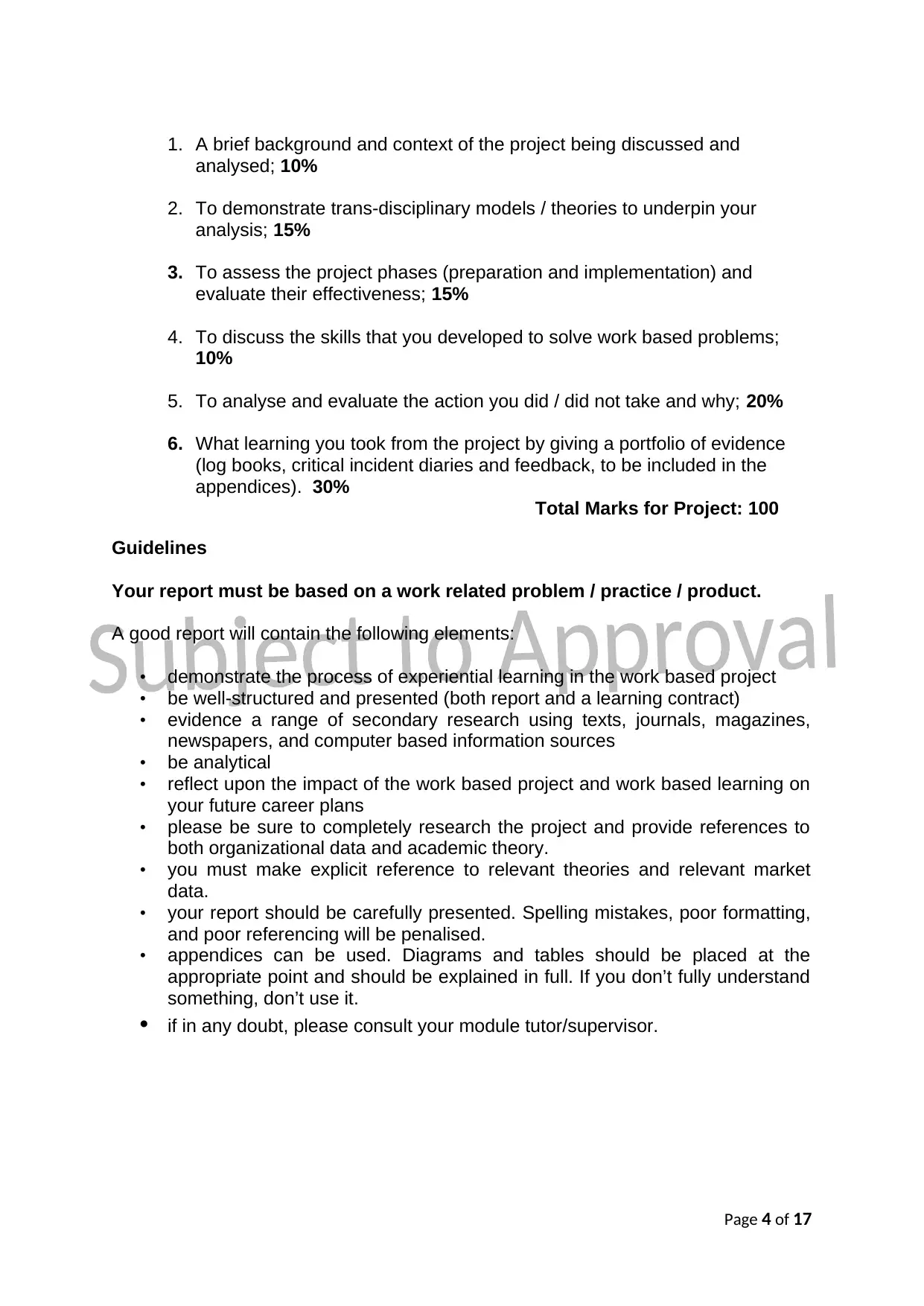
1. A brief background and context of the project being discussed and
analysed; 10%
2. To demonstrate trans-disciplinary models / theories to underpin your
analysis; 15%
3. To assess the project phases (preparation and implementation) and
evaluate their effectiveness; 15%
4. To discuss the skills that you developed to solve work based problems;
10%
5. To analyse and evaluate the action you did / did not take and why; 20%
6. What learning you took from the project by giving a portfolio of evidence
(log books, critical incident diaries and feedback, to be included in the
appendices). 30%
Total Marks for Project: 100
Guidelines
Your report must be based on a work related problem / practice / product.
A good report will contain the following elements:
• demonstrate the process of experiential learning in the work based project
• be well-structured and presented (both report and a learning contract)
• evidence a range of secondary research using texts, journals, magazines,
newspapers, and computer based information sources
• be analytical
• reflect upon the impact of the work based project and work based learning on
your future career plans
• please be sure to completely research the project and provide references to
both organizational data and academic theory.
• you must make explicit reference to relevant theories and relevant market
data.
• your report should be carefully presented. Spelling mistakes, poor formatting,
and poor referencing will be penalised.
• appendices can be used. Diagrams and tables should be placed at the
appropriate point and should be explained in full. If you don’t fully understand
something, don’t use it.
• if in any doubt, please consult your module tutor/supervisor.
Page 4 of 17
analysed; 10%
2. To demonstrate trans-disciplinary models / theories to underpin your
analysis; 15%
3. To assess the project phases (preparation and implementation) and
evaluate their effectiveness; 15%
4. To discuss the skills that you developed to solve work based problems;
10%
5. To analyse and evaluate the action you did / did not take and why; 20%
6. What learning you took from the project by giving a portfolio of evidence
(log books, critical incident diaries and feedback, to be included in the
appendices). 30%
Total Marks for Project: 100
Guidelines
Your report must be based on a work related problem / practice / product.
A good report will contain the following elements:
• demonstrate the process of experiential learning in the work based project
• be well-structured and presented (both report and a learning contract)
• evidence a range of secondary research using texts, journals, magazines,
newspapers, and computer based information sources
• be analytical
• reflect upon the impact of the work based project and work based learning on
your future career plans
• please be sure to completely research the project and provide references to
both organizational data and academic theory.
• you must make explicit reference to relevant theories and relevant market
data.
• your report should be carefully presented. Spelling mistakes, poor formatting,
and poor referencing will be penalised.
• appendices can be used. Diagrams and tables should be placed at the
appropriate point and should be explained in full. If you don’t fully understand
something, don’t use it.
• if in any doubt, please consult your module tutor/supervisor.
Page 4 of 17
Paraphrase This Document
Need a fresh take? Get an instant paraphrase of this document with our AI Paraphraser
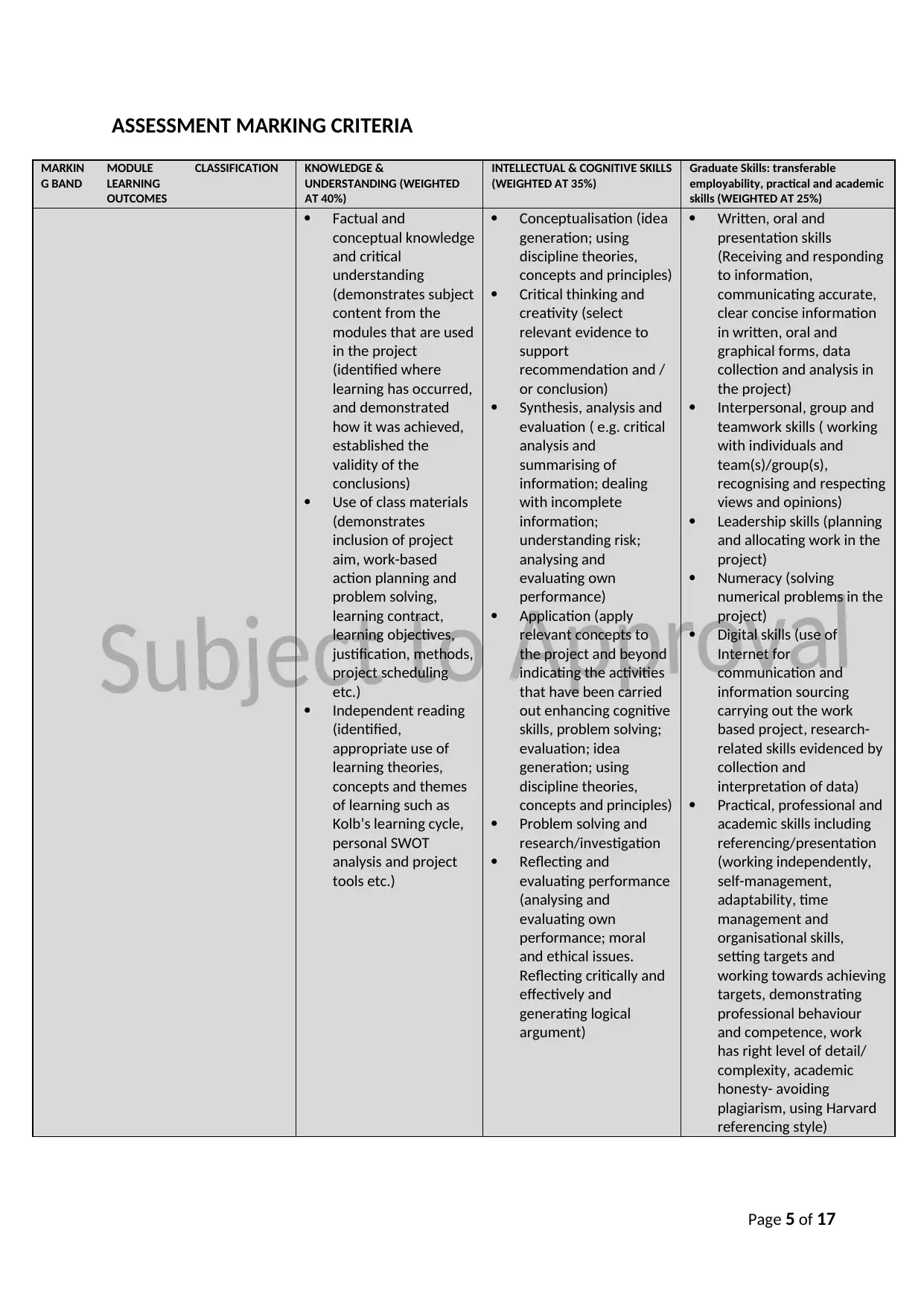
ASSESSMENT MARKING CRITERIA
MARKIN
G BAND
MODULE
LEARNING
OUTCOMES
CLASSIFICATION KNOWLEDGE &
UNDERSTANDING (WEIGHTED
AT 40%)
INTELLECTUAL & COGNITIVE SKILLS
(WEIGHTED AT 35%)
Graduate Skills: transferable
employability, practical and academic
skills (WEIGHTED AT 25%)
Factual and
conceptual knowledge
and critical
understanding
(demonstrates subject
content from the
modules that are used
in the project
(identified where
learning has occurred,
and demonstrated
how it was achieved,
established the
validity of the
conclusions)
Use of class materials
(demonstrates
inclusion of project
aim, work-based
action planning and
problem solving,
learning contract,
learning objectives,
justification, methods,
project scheduling
etc.)
Independent reading
(identified,
appropriate use of
learning theories,
concepts and themes
of learning such as
Kolb’s learning cycle,
personal SWOT
analysis and project
tools etc.)
Conceptualisation (idea
generation; using
discipline theories,
concepts and principles)
Critical thinking and
creativity (select
relevant evidence to
support
recommendation and /
or conclusion)
Synthesis, analysis and
evaluation ( e.g. critical
analysis and
summarising of
information; dealing
with incomplete
information;
understanding risk;
analysing and
evaluating own
performance)
Application (apply
relevant concepts to
the project and beyond
indicating the activities
that have been carried
out enhancing cognitive
skills, problem solving;
evaluation; idea
generation; using
discipline theories,
concepts and principles)
Problem solving and
research/investigation
Reflecting and
evaluating performance
(analysing and
evaluating own
performance; moral
and ethical issues.
Reflecting critically and
effectively and
generating logical
argument)
Written, oral and
presentation skills
(Receiving and responding
to information,
communicating accurate,
clear concise information
in written, oral and
graphical forms, data
collection and analysis in
the project)
Interpersonal, group and
teamwork skills ( working
with individuals and
team(s)/group(s),
recognising and respecting
views and opinions)
Leadership skills (planning
and allocating work in the
project)
Numeracy (solving
numerical problems in the
project)
Digital skills (use of
Internet for
communication and
information sourcing
carrying out the work
based project, research-
related skills evidenced by
collection and
interpretation of data)
Practical, professional and
academic skills including
referencing/presentation
(working independently,
self-management,
adaptability, time
management and
organisational skills,
setting targets and
working towards achieving
targets, demonstrating
professional behaviour
and competence, work
has right level of detail/
complexity, academic
honesty- avoiding
plagiarism, using Harvard
referencing style)
Page 5 of 17
MARKIN
G BAND
MODULE
LEARNING
OUTCOMES
CLASSIFICATION KNOWLEDGE &
UNDERSTANDING (WEIGHTED
AT 40%)
INTELLECTUAL & COGNITIVE SKILLS
(WEIGHTED AT 35%)
Graduate Skills: transferable
employability, practical and academic
skills (WEIGHTED AT 25%)
Factual and
conceptual knowledge
and critical
understanding
(demonstrates subject
content from the
modules that are used
in the project
(identified where
learning has occurred,
and demonstrated
how it was achieved,
established the
validity of the
conclusions)
Use of class materials
(demonstrates
inclusion of project
aim, work-based
action planning and
problem solving,
learning contract,
learning objectives,
justification, methods,
project scheduling
etc.)
Independent reading
(identified,
appropriate use of
learning theories,
concepts and themes
of learning such as
Kolb’s learning cycle,
personal SWOT
analysis and project
tools etc.)
Conceptualisation (idea
generation; using
discipline theories,
concepts and principles)
Critical thinking and
creativity (select
relevant evidence to
support
recommendation and /
or conclusion)
Synthesis, analysis and
evaluation ( e.g. critical
analysis and
summarising of
information; dealing
with incomplete
information;
understanding risk;
analysing and
evaluating own
performance)
Application (apply
relevant concepts to
the project and beyond
indicating the activities
that have been carried
out enhancing cognitive
skills, problem solving;
evaluation; idea
generation; using
discipline theories,
concepts and principles)
Problem solving and
research/investigation
Reflecting and
evaluating performance
(analysing and
evaluating own
performance; moral
and ethical issues.
Reflecting critically and
effectively and
generating logical
argument)
Written, oral and
presentation skills
(Receiving and responding
to information,
communicating accurate,
clear concise information
in written, oral and
graphical forms, data
collection and analysis in
the project)
Interpersonal, group and
teamwork skills ( working
with individuals and
team(s)/group(s),
recognising and respecting
views and opinions)
Leadership skills (planning
and allocating work in the
project)
Numeracy (solving
numerical problems in the
project)
Digital skills (use of
Internet for
communication and
information sourcing
carrying out the work
based project, research-
related skills evidenced by
collection and
interpretation of data)
Practical, professional and
academic skills including
referencing/presentation
(working independently,
self-management,
adaptability, time
management and
organisational skills,
setting targets and
working towards achieving
targets, demonstrating
professional behaviour
and competence, work
has right level of detail/
complexity, academic
honesty- avoiding
plagiarism, using Harvard
referencing style)
Page 5 of 17
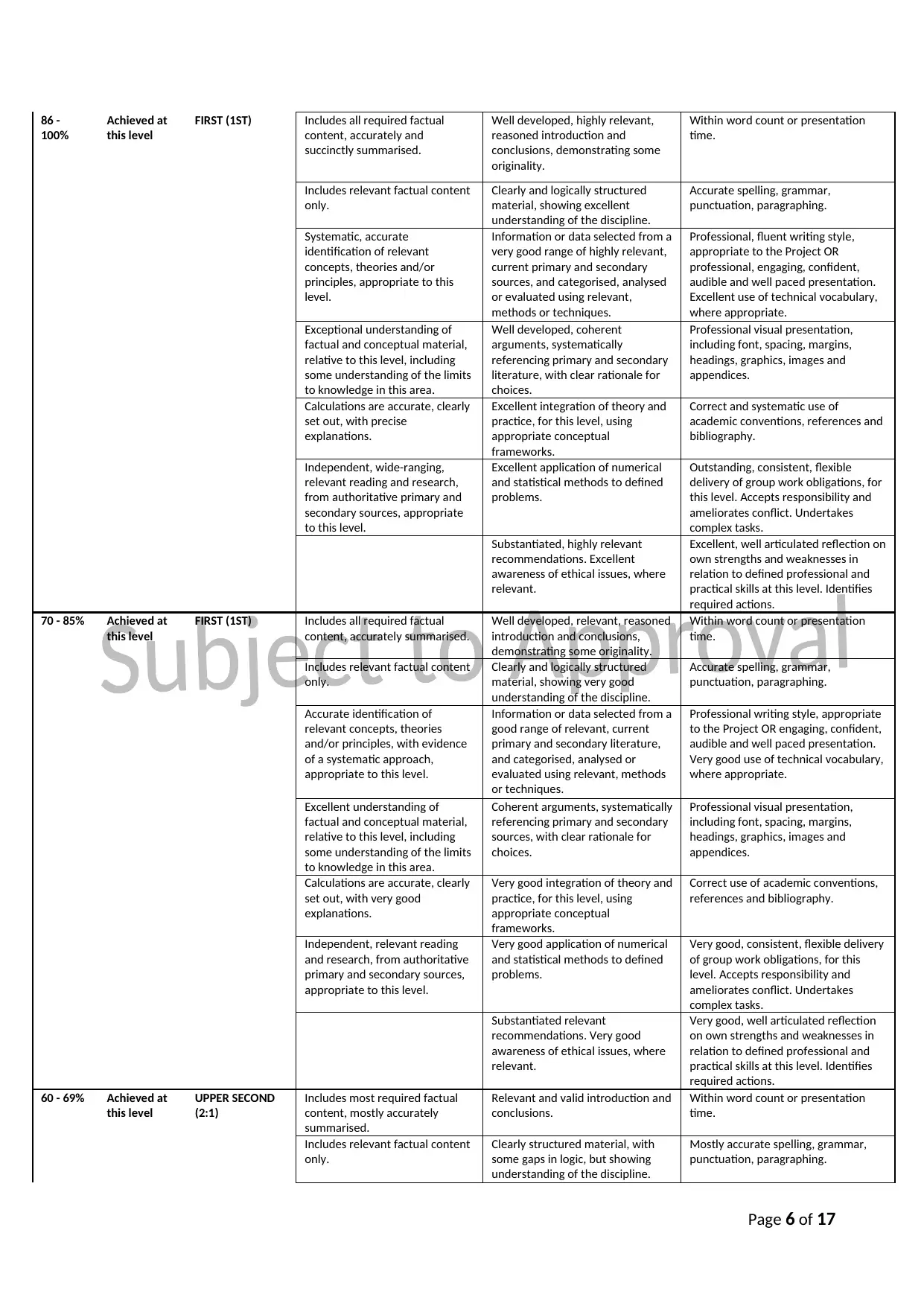
86 -
100%
Achieved at
this level
FIRST (1ST) Includes all required factual
content, accurately and
succinctly summarised.
Well developed, highly relevant,
reasoned introduction and
conclusions, demonstrating some
originality.
Within word count or presentation
time.
Includes relevant factual content
only.
Clearly and logically structured
material, showing excellent
understanding of the discipline.
Accurate spelling, grammar,
punctuation, paragraphing.
Systematic, accurate
identification of relevant
concepts, theories and/or
principles, appropriate to this
level.
Information or data selected from a
very good range of highly relevant,
current primary and secondary
sources, and categorised, analysed
or evaluated using relevant,
methods or techniques.
Professional, fluent writing style,
appropriate to the Project OR
professional, engaging, confident,
audible and well paced presentation.
Excellent use of technical vocabulary,
where appropriate.
Exceptional understanding of
factual and conceptual material,
relative to this level, including
some understanding of the limits
to knowledge in this area.
Well developed, coherent
arguments, systematically
referencing primary and secondary
literature, with clear rationale for
choices.
Professional visual presentation,
including font, spacing, margins,
headings, graphics, images and
appendices.
Calculations are accurate, clearly
set out, with precise
explanations.
Excellent integration of theory and
practice, for this level, using
appropriate conceptual
frameworks.
Correct and systematic use of
academic conventions, references and
bibliography.
Independent, wide-ranging,
relevant reading and research,
from authoritative primary and
secondary sources, appropriate
to this level.
Excellent application of numerical
and statistical methods to defined
problems.
Outstanding, consistent, flexible
delivery of group work obligations, for
this level. Accepts responsibility and
ameliorates conflict. Undertakes
complex tasks.
Substantiated, highly relevant
recommendations. Excellent
awareness of ethical issues, where
relevant.
Excellent, well articulated reflection on
own strengths and weaknesses in
relation to defined professional and
practical skills at this level. Identifies
required actions.
70 - 85% Achieved at
this level
FIRST (1ST) Includes all required factual
content, accurately summarised.
Well developed, relevant, reasoned
introduction and conclusions,
demonstrating some originality.
Within word count or presentation
time.
Includes relevant factual content
only.
Clearly and logically structured
material, showing very good
understanding of the discipline.
Accurate spelling, grammar,
punctuation, paragraphing.
Accurate identification of
relevant concepts, theories
and/or principles, with evidence
of a systematic approach,
appropriate to this level.
Information or data selected from a
good range of relevant, current
primary and secondary literature,
and categorised, analysed or
evaluated using relevant, methods
or techniques.
Professional writing style, appropriate
to the Project OR engaging, confident,
audible and well paced presentation.
Very good use of technical vocabulary,
where appropriate.
Excellent understanding of
factual and conceptual material,
relative to this level, including
some understanding of the limits
to knowledge in this area.
Coherent arguments, systematically
referencing primary and secondary
sources, with clear rationale for
choices.
Professional visual presentation,
including font, spacing, margins,
headings, graphics, images and
appendices.
Calculations are accurate, clearly
set out, with very good
explanations.
Very good integration of theory and
practice, for this level, using
appropriate conceptual
frameworks.
Correct use of academic conventions,
references and bibliography.
Independent, relevant reading
and research, from authoritative
primary and secondary sources,
appropriate to this level.
Very good application of numerical
and statistical methods to defined
problems.
Very good, consistent, flexible delivery
of group work obligations, for this
level. Accepts responsibility and
ameliorates conflict. Undertakes
complex tasks.
Substantiated relevant
recommendations. Very good
awareness of ethical issues, where
relevant.
Very good, well articulated reflection
on own strengths and weaknesses in
relation to defined professional and
practical skills at this level. Identifies
required actions.
60 - 69% Achieved at
this level
UPPER SECOND
(2:1)
Includes most required factual
content, mostly accurately
summarised.
Relevant and valid introduction and
conclusions.
Within word count or presentation
time.
Includes relevant factual content
only.
Clearly structured material, with
some gaps in logic, but showing
understanding of the discipline.
Mostly accurate spelling, grammar,
punctuation, paragraphing.
Page 6 of 17
100%
Achieved at
this level
FIRST (1ST) Includes all required factual
content, accurately and
succinctly summarised.
Well developed, highly relevant,
reasoned introduction and
conclusions, demonstrating some
originality.
Within word count or presentation
time.
Includes relevant factual content
only.
Clearly and logically structured
material, showing excellent
understanding of the discipline.
Accurate spelling, grammar,
punctuation, paragraphing.
Systematic, accurate
identification of relevant
concepts, theories and/or
principles, appropriate to this
level.
Information or data selected from a
very good range of highly relevant,
current primary and secondary
sources, and categorised, analysed
or evaluated using relevant,
methods or techniques.
Professional, fluent writing style,
appropriate to the Project OR
professional, engaging, confident,
audible and well paced presentation.
Excellent use of technical vocabulary,
where appropriate.
Exceptional understanding of
factual and conceptual material,
relative to this level, including
some understanding of the limits
to knowledge in this area.
Well developed, coherent
arguments, systematically
referencing primary and secondary
literature, with clear rationale for
choices.
Professional visual presentation,
including font, spacing, margins,
headings, graphics, images and
appendices.
Calculations are accurate, clearly
set out, with precise
explanations.
Excellent integration of theory and
practice, for this level, using
appropriate conceptual
frameworks.
Correct and systematic use of
academic conventions, references and
bibliography.
Independent, wide-ranging,
relevant reading and research,
from authoritative primary and
secondary sources, appropriate
to this level.
Excellent application of numerical
and statistical methods to defined
problems.
Outstanding, consistent, flexible
delivery of group work obligations, for
this level. Accepts responsibility and
ameliorates conflict. Undertakes
complex tasks.
Substantiated, highly relevant
recommendations. Excellent
awareness of ethical issues, where
relevant.
Excellent, well articulated reflection on
own strengths and weaknesses in
relation to defined professional and
practical skills at this level. Identifies
required actions.
70 - 85% Achieved at
this level
FIRST (1ST) Includes all required factual
content, accurately summarised.
Well developed, relevant, reasoned
introduction and conclusions,
demonstrating some originality.
Within word count or presentation
time.
Includes relevant factual content
only.
Clearly and logically structured
material, showing very good
understanding of the discipline.
Accurate spelling, grammar,
punctuation, paragraphing.
Accurate identification of
relevant concepts, theories
and/or principles, with evidence
of a systematic approach,
appropriate to this level.
Information or data selected from a
good range of relevant, current
primary and secondary literature,
and categorised, analysed or
evaluated using relevant, methods
or techniques.
Professional writing style, appropriate
to the Project OR engaging, confident,
audible and well paced presentation.
Very good use of technical vocabulary,
where appropriate.
Excellent understanding of
factual and conceptual material,
relative to this level, including
some understanding of the limits
to knowledge in this area.
Coherent arguments, systematically
referencing primary and secondary
sources, with clear rationale for
choices.
Professional visual presentation,
including font, spacing, margins,
headings, graphics, images and
appendices.
Calculations are accurate, clearly
set out, with very good
explanations.
Very good integration of theory and
practice, for this level, using
appropriate conceptual
frameworks.
Correct use of academic conventions,
references and bibliography.
Independent, relevant reading
and research, from authoritative
primary and secondary sources,
appropriate to this level.
Very good application of numerical
and statistical methods to defined
problems.
Very good, consistent, flexible delivery
of group work obligations, for this
level. Accepts responsibility and
ameliorates conflict. Undertakes
complex tasks.
Substantiated relevant
recommendations. Very good
awareness of ethical issues, where
relevant.
Very good, well articulated reflection
on own strengths and weaknesses in
relation to defined professional and
practical skills at this level. Identifies
required actions.
60 - 69% Achieved at
this level
UPPER SECOND
(2:1)
Includes most required factual
content, mostly accurately
summarised.
Relevant and valid introduction and
conclusions.
Within word count or presentation
time.
Includes relevant factual content
only.
Clearly structured material, with
some gaps in logic, but showing
understanding of the discipline.
Mostly accurate spelling, grammar,
punctuation, paragraphing.
Page 6 of 17
⊘ This is a preview!⊘
Do you want full access?
Subscribe today to unlock all pages.

Trusted by 1+ million students worldwide
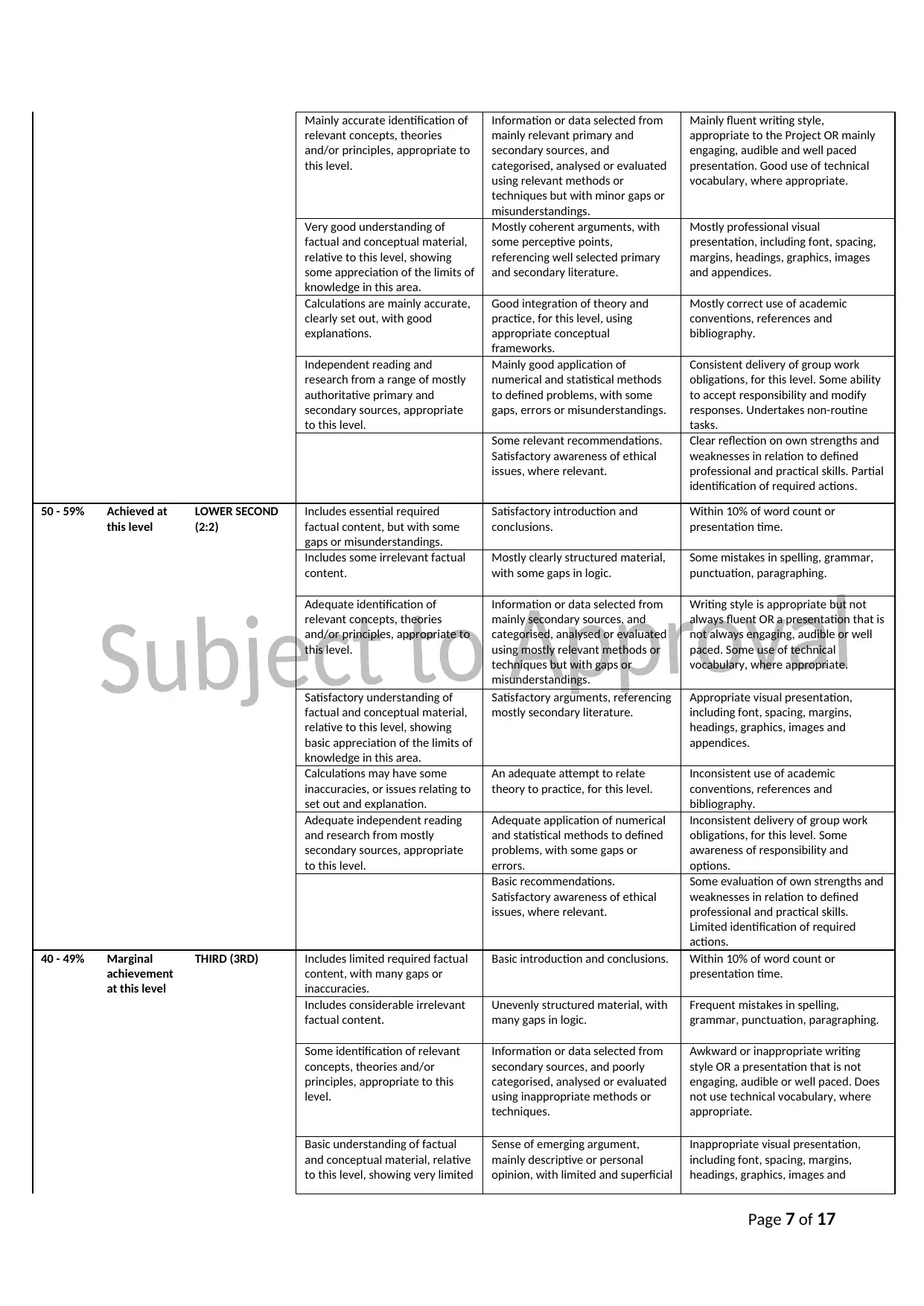
Mainly accurate identification of
relevant concepts, theories
and/or principles, appropriate to
this level.
Information or data selected from
mainly relevant primary and
secondary sources, and
categorised, analysed or evaluated
using relevant methods or
techniques but with minor gaps or
misunderstandings.
Mainly fluent writing style,
appropriate to the Project OR mainly
engaging, audible and well paced
presentation. Good use of technical
vocabulary, where appropriate.
Very good understanding of
factual and conceptual material,
relative to this level, showing
some appreciation of the limits of
knowledge in this area.
Mostly coherent arguments, with
some perceptive points,
referencing well selected primary
and secondary literature.
Mostly professional visual
presentation, including font, spacing,
margins, headings, graphics, images
and appendices.
Calculations are mainly accurate,
clearly set out, with good
explanations.
Good integration of theory and
practice, for this level, using
appropriate conceptual
frameworks.
Mostly correct use of academic
conventions, references and
bibliography.
Independent reading and
research from a range of mostly
authoritative primary and
secondary sources, appropriate
to this level.
Mainly good application of
numerical and statistical methods
to defined problems, with some
gaps, errors or misunderstandings.
Consistent delivery of group work
obligations, for this level. Some ability
to accept responsibility and modify
responses. Undertakes non-routine
tasks.
Some relevant recommendations.
Satisfactory awareness of ethical
issues, where relevant.
Clear reflection on own strengths and
weaknesses in relation to defined
professional and practical skills. Partial
identification of required actions.
50 - 59% Achieved at
this level
LOWER SECOND
(2:2)
Includes essential required
factual content, but with some
gaps or misunderstandings.
Satisfactory introduction and
conclusions.
Within 10% of word count or
presentation time.
Includes some irrelevant factual
content.
Mostly clearly structured material,
with some gaps in logic.
Some mistakes in spelling, grammar,
punctuation, paragraphing.
Adequate identification of
relevant concepts, theories
and/or principles, appropriate to
this level.
Information or data selected from
mainly secondary sources, and
categorised, analysed or evaluated
using mostly relevant methods or
techniques but with gaps or
misunderstandings.
Writing style is appropriate but not
always fluent OR a presentation that is
not always engaging, audible or well
paced. Some use of technical
vocabulary, where appropriate.
Satisfactory understanding of
factual and conceptual material,
relative to this level, showing
basic appreciation of the limits of
knowledge in this area.
Satisfactory arguments, referencing
mostly secondary literature.
Appropriate visual presentation,
including font, spacing, margins,
headings, graphics, images and
appendices.
Calculations may have some
inaccuracies, or issues relating to
set out and explanation.
An adequate attempt to relate
theory to practice, for this level.
Inconsistent use of academic
conventions, references and
bibliography.
Adequate independent reading
and research from mostly
secondary sources, appropriate
to this level.
Adequate application of numerical
and statistical methods to defined
problems, with some gaps or
errors.
Inconsistent delivery of group work
obligations, for this level. Some
awareness of responsibility and
options.
Basic recommendations.
Satisfactory awareness of ethical
issues, where relevant.
Some evaluation of own strengths and
weaknesses in relation to defined
professional and practical skills.
Limited identification of required
actions.
40 - 49% Marginal
achievement
at this level
THIRD (3RD) Includes limited required factual
content, with many gaps or
inaccuracies.
Basic introduction and conclusions. Within 10% of word count or
presentation time.
Includes considerable irrelevant
factual content.
Unevenly structured material, with
many gaps in logic.
Frequent mistakes in spelling,
grammar, punctuation, paragraphing.
Some identification of relevant
concepts, theories and/or
principles, appropriate to this
level.
Information or data selected from
secondary sources, and poorly
categorised, analysed or evaluated
using inappropriate methods or
techniques.
Awkward or inappropriate writing
style OR a presentation that is not
engaging, audible or well paced. Does
not use technical vocabulary, where
appropriate.
Basic understanding of factual
and conceptual material, relative
to this level, showing very limited
Sense of emerging argument,
mainly descriptive or personal
opinion, with limited and superficial
Inappropriate visual presentation,
including font, spacing, margins,
headings, graphics, images and
Page 7 of 17
relevant concepts, theories
and/or principles, appropriate to
this level.
Information or data selected from
mainly relevant primary and
secondary sources, and
categorised, analysed or evaluated
using relevant methods or
techniques but with minor gaps or
misunderstandings.
Mainly fluent writing style,
appropriate to the Project OR mainly
engaging, audible and well paced
presentation. Good use of technical
vocabulary, where appropriate.
Very good understanding of
factual and conceptual material,
relative to this level, showing
some appreciation of the limits of
knowledge in this area.
Mostly coherent arguments, with
some perceptive points,
referencing well selected primary
and secondary literature.
Mostly professional visual
presentation, including font, spacing,
margins, headings, graphics, images
and appendices.
Calculations are mainly accurate,
clearly set out, with good
explanations.
Good integration of theory and
practice, for this level, using
appropriate conceptual
frameworks.
Mostly correct use of academic
conventions, references and
bibliography.
Independent reading and
research from a range of mostly
authoritative primary and
secondary sources, appropriate
to this level.
Mainly good application of
numerical and statistical methods
to defined problems, with some
gaps, errors or misunderstandings.
Consistent delivery of group work
obligations, for this level. Some ability
to accept responsibility and modify
responses. Undertakes non-routine
tasks.
Some relevant recommendations.
Satisfactory awareness of ethical
issues, where relevant.
Clear reflection on own strengths and
weaknesses in relation to defined
professional and practical skills. Partial
identification of required actions.
50 - 59% Achieved at
this level
LOWER SECOND
(2:2)
Includes essential required
factual content, but with some
gaps or misunderstandings.
Satisfactory introduction and
conclusions.
Within 10% of word count or
presentation time.
Includes some irrelevant factual
content.
Mostly clearly structured material,
with some gaps in logic.
Some mistakes in spelling, grammar,
punctuation, paragraphing.
Adequate identification of
relevant concepts, theories
and/or principles, appropriate to
this level.
Information or data selected from
mainly secondary sources, and
categorised, analysed or evaluated
using mostly relevant methods or
techniques but with gaps or
misunderstandings.
Writing style is appropriate but not
always fluent OR a presentation that is
not always engaging, audible or well
paced. Some use of technical
vocabulary, where appropriate.
Satisfactory understanding of
factual and conceptual material,
relative to this level, showing
basic appreciation of the limits of
knowledge in this area.
Satisfactory arguments, referencing
mostly secondary literature.
Appropriate visual presentation,
including font, spacing, margins,
headings, graphics, images and
appendices.
Calculations may have some
inaccuracies, or issues relating to
set out and explanation.
An adequate attempt to relate
theory to practice, for this level.
Inconsistent use of academic
conventions, references and
bibliography.
Adequate independent reading
and research from mostly
secondary sources, appropriate
to this level.
Adequate application of numerical
and statistical methods to defined
problems, with some gaps or
errors.
Inconsistent delivery of group work
obligations, for this level. Some
awareness of responsibility and
options.
Basic recommendations.
Satisfactory awareness of ethical
issues, where relevant.
Some evaluation of own strengths and
weaknesses in relation to defined
professional and practical skills.
Limited identification of required
actions.
40 - 49% Marginal
achievement
at this level
THIRD (3RD) Includes limited required factual
content, with many gaps or
inaccuracies.
Basic introduction and conclusions. Within 10% of word count or
presentation time.
Includes considerable irrelevant
factual content.
Unevenly structured material, with
many gaps in logic.
Frequent mistakes in spelling,
grammar, punctuation, paragraphing.
Some identification of relevant
concepts, theories and/or
principles, appropriate to this
level.
Information or data selected from
secondary sources, and poorly
categorised, analysed or evaluated
using inappropriate methods or
techniques.
Awkward or inappropriate writing
style OR a presentation that is not
engaging, audible or well paced. Does
not use technical vocabulary, where
appropriate.
Basic understanding of factual
and conceptual material, relative
to this level, showing very limited
Sense of emerging argument,
mainly descriptive or personal
opinion, with limited and superficial
Inappropriate visual presentation,
including font, spacing, margins,
headings, graphics, images and
Page 7 of 17
Paraphrase This Document
Need a fresh take? Get an instant paraphrase of this document with our AI Paraphraser
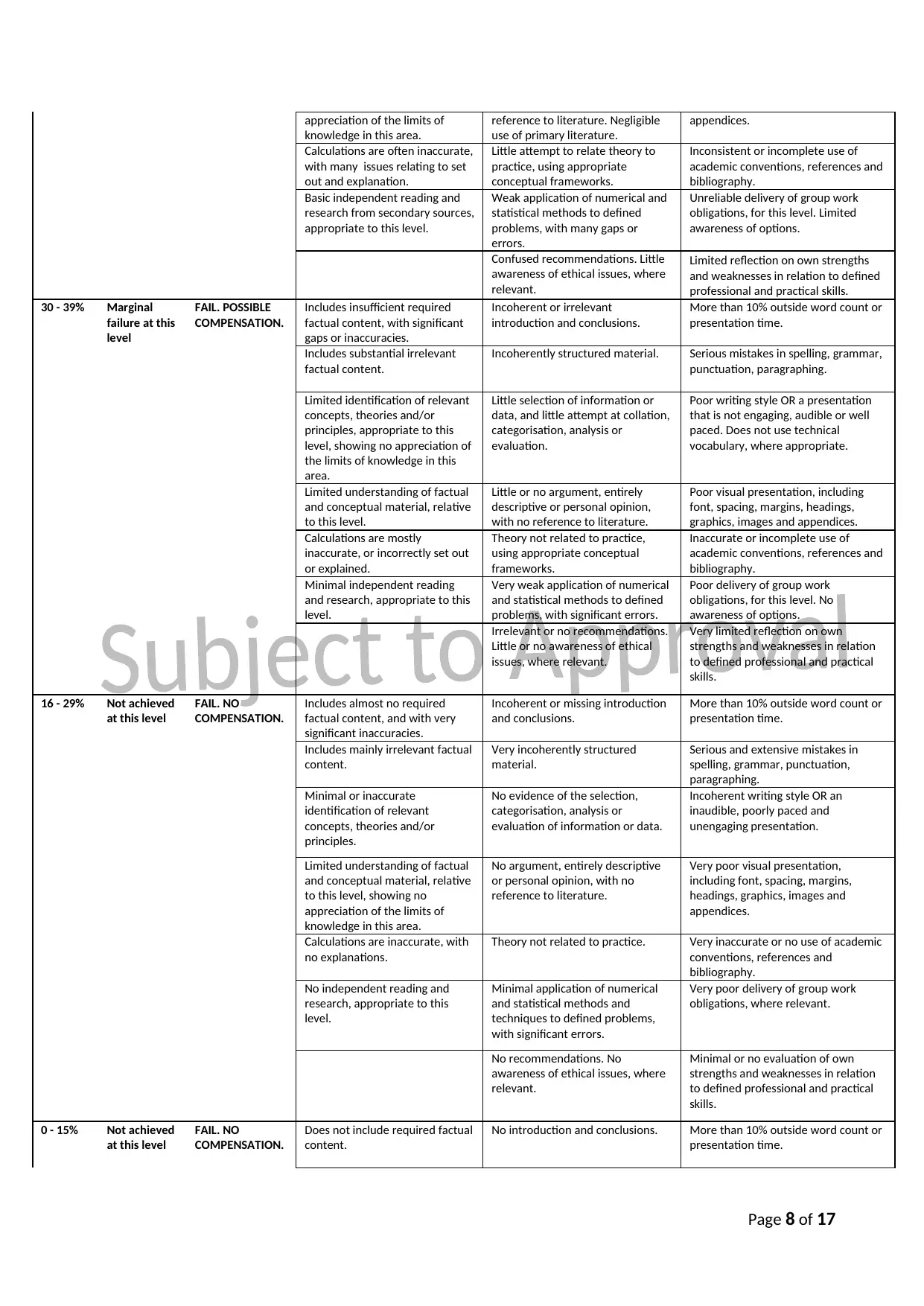
appreciation of the limits of
knowledge in this area.
reference to literature. Negligible
use of primary literature.
appendices.
Calculations are often inaccurate,
with many issues relating to set
out and explanation.
Little attempt to relate theory to
practice, using appropriate
conceptual frameworks.
Inconsistent or incomplete use of
academic conventions, references and
bibliography.
Basic independent reading and
research from secondary sources,
appropriate to this level.
Weak application of numerical and
statistical methods to defined
problems, with many gaps or
errors.
Unreliable delivery of group work
obligations, for this level. Limited
awareness of options.
Confused recommendations. Little
awareness of ethical issues, where
relevant.
Limited reflection on own strengths
and weaknesses in relation to defined
professional and practical skills.
30 - 39% Marginal
failure at this
level
FAIL. POSSIBLE
COMPENSATION.
Includes insufficient required
factual content, with significant
gaps or inaccuracies.
Incoherent or irrelevant
introduction and conclusions.
More than 10% outside word count or
presentation time.
Includes substantial irrelevant
factual content.
Incoherently structured material. Serious mistakes in spelling, grammar,
punctuation, paragraphing.
Limited identification of relevant
concepts, theories and/or
principles, appropriate to this
level, showing no appreciation of
the limits of knowledge in this
area.
Little selection of information or
data, and little attempt at collation,
categorisation, analysis or
evaluation.
Poor writing style OR a presentation
that is not engaging, audible or well
paced. Does not use technical
vocabulary, where appropriate.
Limited understanding of factual
and conceptual material, relative
to this level.
Little or no argument, entirely
descriptive or personal opinion,
with no reference to literature.
Poor visual presentation, including
font, spacing, margins, headings,
graphics, images and appendices.
Calculations are mostly
inaccurate, or incorrectly set out
or explained.
Theory not related to practice,
using appropriate conceptual
frameworks.
Inaccurate or incomplete use of
academic conventions, references and
bibliography.
Minimal independent reading
and research, appropriate to this
level.
Very weak application of numerical
and statistical methods to defined
problems, with significant errors.
Poor delivery of group work
obligations, for this level. No
awareness of options.
Irrelevant or no recommendations.
Little or no awareness of ethical
issues, where relevant.
Very limited reflection on own
strengths and weaknesses in relation
to defined professional and practical
skills.
16 - 29% Not achieved
at this level
FAIL. NO
COMPENSATION.
Includes almost no required
factual content, and with very
significant inaccuracies.
Incoherent or missing introduction
and conclusions.
More than 10% outside word count or
presentation time.
Includes mainly irrelevant factual
content.
Very incoherently structured
material.
Serious and extensive mistakes in
spelling, grammar, punctuation,
paragraphing.
Minimal or inaccurate
identification of relevant
concepts, theories and/or
principles.
No evidence of the selection,
categorisation, analysis or
evaluation of information or data.
Incoherent writing style OR an
inaudible, poorly paced and
unengaging presentation.
Limited understanding of factual
and conceptual material, relative
to this level, showing no
appreciation of the limits of
knowledge in this area.
No argument, entirely descriptive
or personal opinion, with no
reference to literature.
Very poor visual presentation,
including font, spacing, margins,
headings, graphics, images and
appendices.
Calculations are inaccurate, with
no explanations.
Theory not related to practice. Very inaccurate or no use of academic
conventions, references and
bibliography.
No independent reading and
research, appropriate to this
level.
Minimal application of numerical
and statistical methods and
techniques to defined problems,
with significant errors.
Very poor delivery of group work
obligations, where relevant.
No recommendations. No
awareness of ethical issues, where
relevant.
Minimal or no evaluation of own
strengths and weaknesses in relation
to defined professional and practical
skills.
0 - 15% Not achieved
at this level
FAIL. NO
COMPENSATION.
Does not include required factual
content.
No introduction and conclusions. More than 10% outside word count or
presentation time.
Page 8 of 17
knowledge in this area.
reference to literature. Negligible
use of primary literature.
appendices.
Calculations are often inaccurate,
with many issues relating to set
out and explanation.
Little attempt to relate theory to
practice, using appropriate
conceptual frameworks.
Inconsistent or incomplete use of
academic conventions, references and
bibliography.
Basic independent reading and
research from secondary sources,
appropriate to this level.
Weak application of numerical and
statistical methods to defined
problems, with many gaps or
errors.
Unreliable delivery of group work
obligations, for this level. Limited
awareness of options.
Confused recommendations. Little
awareness of ethical issues, where
relevant.
Limited reflection on own strengths
and weaknesses in relation to defined
professional and practical skills.
30 - 39% Marginal
failure at this
level
FAIL. POSSIBLE
COMPENSATION.
Includes insufficient required
factual content, with significant
gaps or inaccuracies.
Incoherent or irrelevant
introduction and conclusions.
More than 10% outside word count or
presentation time.
Includes substantial irrelevant
factual content.
Incoherently structured material. Serious mistakes in spelling, grammar,
punctuation, paragraphing.
Limited identification of relevant
concepts, theories and/or
principles, appropriate to this
level, showing no appreciation of
the limits of knowledge in this
area.
Little selection of information or
data, and little attempt at collation,
categorisation, analysis or
evaluation.
Poor writing style OR a presentation
that is not engaging, audible or well
paced. Does not use technical
vocabulary, where appropriate.
Limited understanding of factual
and conceptual material, relative
to this level.
Little or no argument, entirely
descriptive or personal opinion,
with no reference to literature.
Poor visual presentation, including
font, spacing, margins, headings,
graphics, images and appendices.
Calculations are mostly
inaccurate, or incorrectly set out
or explained.
Theory not related to practice,
using appropriate conceptual
frameworks.
Inaccurate or incomplete use of
academic conventions, references and
bibliography.
Minimal independent reading
and research, appropriate to this
level.
Very weak application of numerical
and statistical methods to defined
problems, with significant errors.
Poor delivery of group work
obligations, for this level. No
awareness of options.
Irrelevant or no recommendations.
Little or no awareness of ethical
issues, where relevant.
Very limited reflection on own
strengths and weaknesses in relation
to defined professional and practical
skills.
16 - 29% Not achieved
at this level
FAIL. NO
COMPENSATION.
Includes almost no required
factual content, and with very
significant inaccuracies.
Incoherent or missing introduction
and conclusions.
More than 10% outside word count or
presentation time.
Includes mainly irrelevant factual
content.
Very incoherently structured
material.
Serious and extensive mistakes in
spelling, grammar, punctuation,
paragraphing.
Minimal or inaccurate
identification of relevant
concepts, theories and/or
principles.
No evidence of the selection,
categorisation, analysis or
evaluation of information or data.
Incoherent writing style OR an
inaudible, poorly paced and
unengaging presentation.
Limited understanding of factual
and conceptual material, relative
to this level, showing no
appreciation of the limits of
knowledge in this area.
No argument, entirely descriptive
or personal opinion, with no
reference to literature.
Very poor visual presentation,
including font, spacing, margins,
headings, graphics, images and
appendices.
Calculations are inaccurate, with
no explanations.
Theory not related to practice. Very inaccurate or no use of academic
conventions, references and
bibliography.
No independent reading and
research, appropriate to this
level.
Minimal application of numerical
and statistical methods and
techniques to defined problems,
with significant errors.
Very poor delivery of group work
obligations, where relevant.
No recommendations. No
awareness of ethical issues, where
relevant.
Minimal or no evaluation of own
strengths and weaknesses in relation
to defined professional and practical
skills.
0 - 15% Not achieved
at this level
FAIL. NO
COMPENSATION.
Does not include required factual
content.
No introduction and conclusions. More than 10% outside word count or
presentation time.
Page 8 of 17
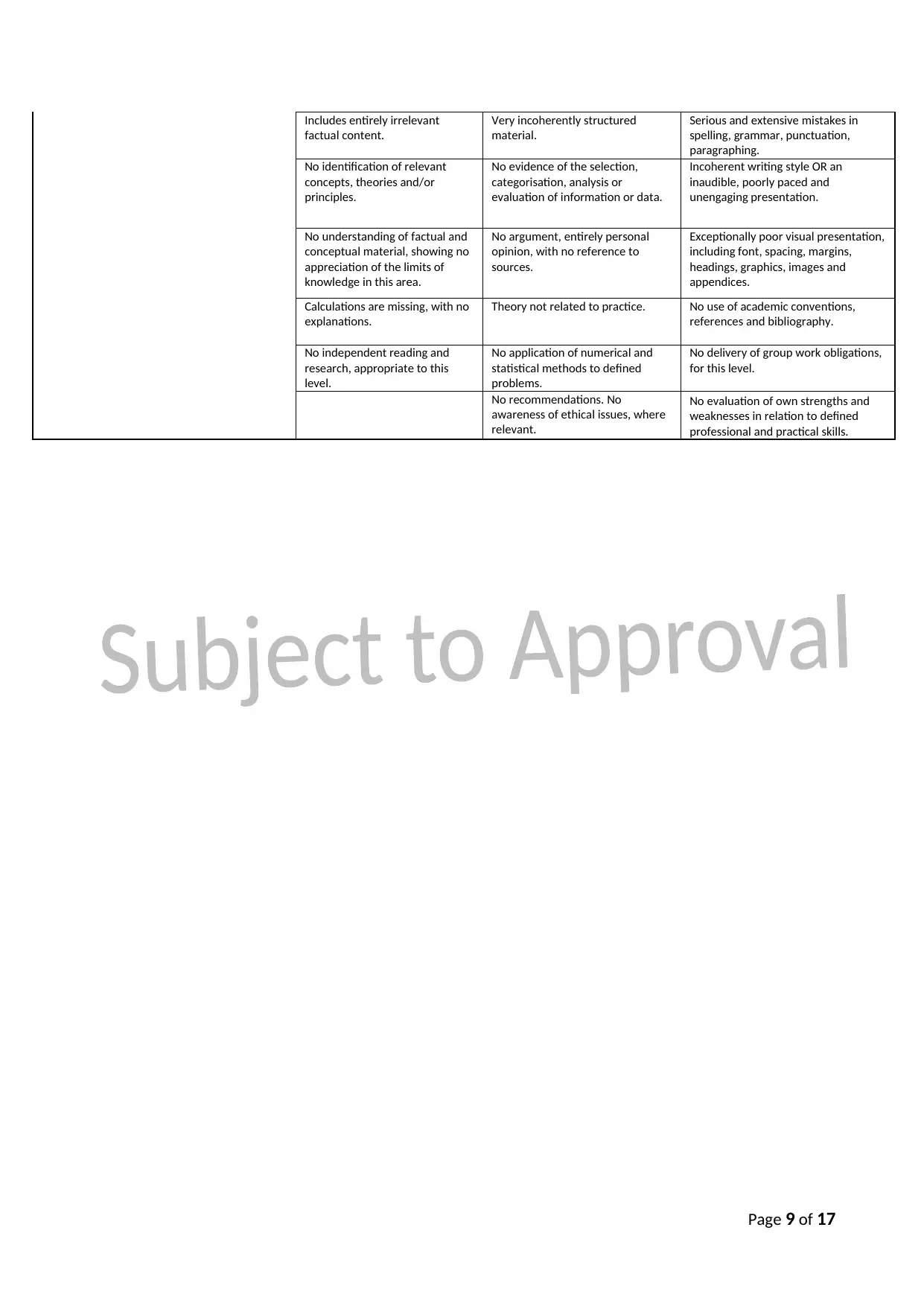
Includes entirely irrelevant
factual content.
Very incoherently structured
material.
Serious and extensive mistakes in
spelling, grammar, punctuation,
paragraphing.
No identification of relevant
concepts, theories and/or
principles.
No evidence of the selection,
categorisation, analysis or
evaluation of information or data.
Incoherent writing style OR an
inaudible, poorly paced and
unengaging presentation.
No understanding of factual and
conceptual material, showing no
appreciation of the limits of
knowledge in this area.
No argument, entirely personal
opinion, with no reference to
sources.
Exceptionally poor visual presentation,
including font, spacing, margins,
headings, graphics, images and
appendices.
Calculations are missing, with no
explanations.
Theory not related to practice. No use of academic conventions,
references and bibliography.
No independent reading and
research, appropriate to this
level.
No application of numerical and
statistical methods to defined
problems.
No delivery of group work obligations,
for this level.
No recommendations. No
awareness of ethical issues, where
relevant.
No evaluation of own strengths and
weaknesses in relation to defined
professional and practical skills.
Page 9 of 17
factual content.
Very incoherently structured
material.
Serious and extensive mistakes in
spelling, grammar, punctuation,
paragraphing.
No identification of relevant
concepts, theories and/or
principles.
No evidence of the selection,
categorisation, analysis or
evaluation of information or data.
Incoherent writing style OR an
inaudible, poorly paced and
unengaging presentation.
No understanding of factual and
conceptual material, showing no
appreciation of the limits of
knowledge in this area.
No argument, entirely personal
opinion, with no reference to
sources.
Exceptionally poor visual presentation,
including font, spacing, margins,
headings, graphics, images and
appendices.
Calculations are missing, with no
explanations.
Theory not related to practice. No use of academic conventions,
references and bibliography.
No independent reading and
research, appropriate to this
level.
No application of numerical and
statistical methods to defined
problems.
No delivery of group work obligations,
for this level.
No recommendations. No
awareness of ethical issues, where
relevant.
No evaluation of own strengths and
weaknesses in relation to defined
professional and practical skills.
Page 9 of 17
⊘ This is a preview!⊘
Do you want full access?
Subscribe today to unlock all pages.

Trusted by 1+ million students worldwide
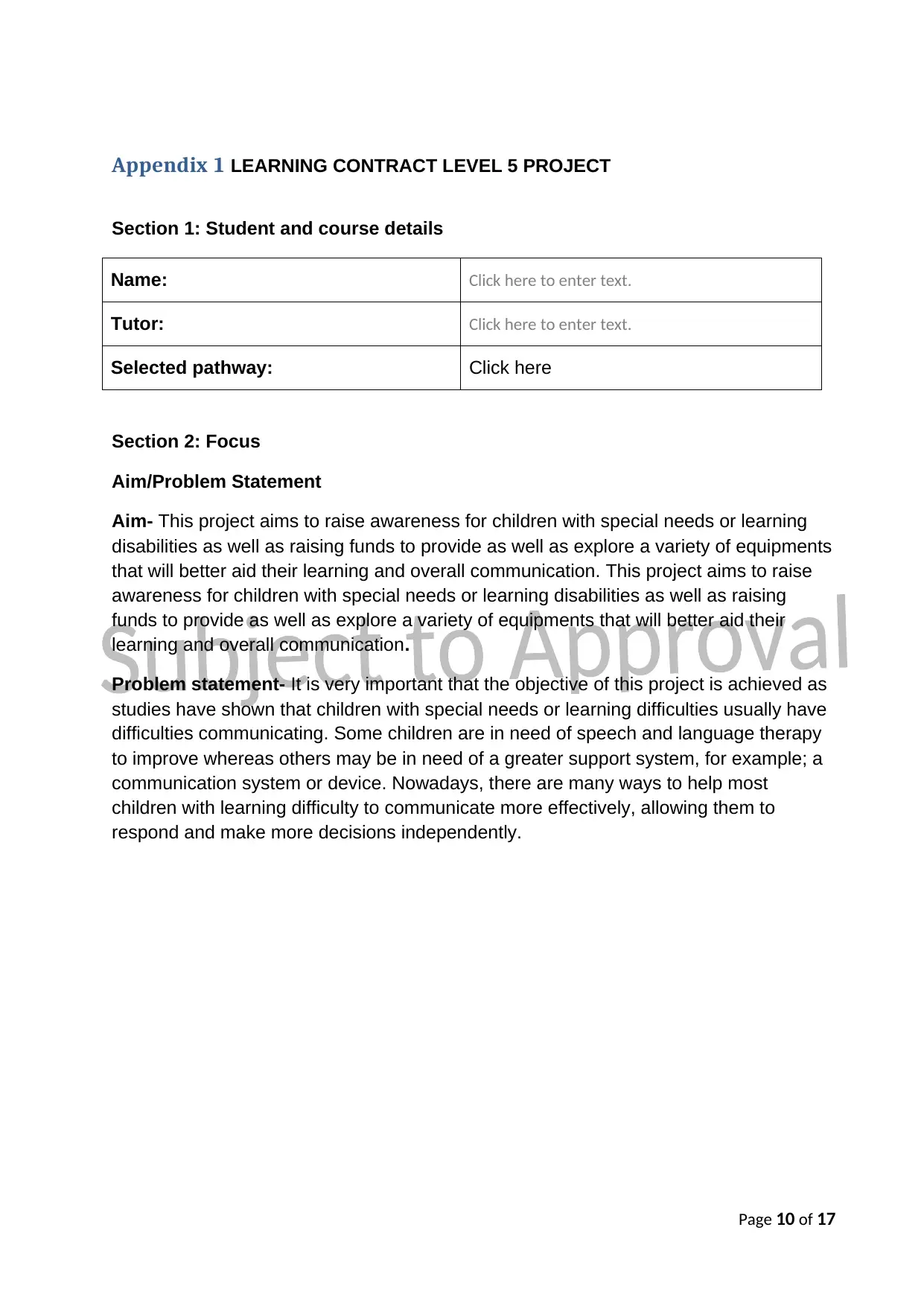
Appendix 1 LEARNING CONTRACT LEVEL 5 PROJECT
Section 1: Student and course details
Name: Click here to enter text.
Tutor: Click here to enter text.
Selected pathway: Click here
Section 2: Focus
Aim/Problem Statement
Aim- This project aims to raise awareness for children with special needs or learning
disabilities as well as raising funds to provide as well as explore a variety of equipments
that will better aid their learning and overall communication. This project aims to raise
awareness for children with special needs or learning disabilities as well as raising
funds to provide as well as explore a variety of equipments that will better aid their
learning and overall communication.
Problem statement- It is very important that the objective of this project is achieved as
studies have shown that children with special needs or learning difficulties usually have
difficulties communicating. Some children are in need of speech and language therapy
to improve whereas others may be in need of a greater support system, for example; a
communication system or device. Nowadays, there are many ways to help most
children with learning difficulty to communicate more effectively, allowing them to
respond and make more decisions independently.
Page 10 of 17
Section 1: Student and course details
Name: Click here to enter text.
Tutor: Click here to enter text.
Selected pathway: Click here
Section 2: Focus
Aim/Problem Statement
Aim- This project aims to raise awareness for children with special needs or learning
disabilities as well as raising funds to provide as well as explore a variety of equipments
that will better aid their learning and overall communication. This project aims to raise
awareness for children with special needs or learning disabilities as well as raising
funds to provide as well as explore a variety of equipments that will better aid their
learning and overall communication.
Problem statement- It is very important that the objective of this project is achieved as
studies have shown that children with special needs or learning difficulties usually have
difficulties communicating. Some children are in need of speech and language therapy
to improve whereas others may be in need of a greater support system, for example; a
communication system or device. Nowadays, there are many ways to help most
children with learning difficulty to communicate more effectively, allowing them to
respond and make more decisions independently.
Page 10 of 17
Paraphrase This Document
Need a fresh take? Get an instant paraphrase of this document with our AI Paraphraser
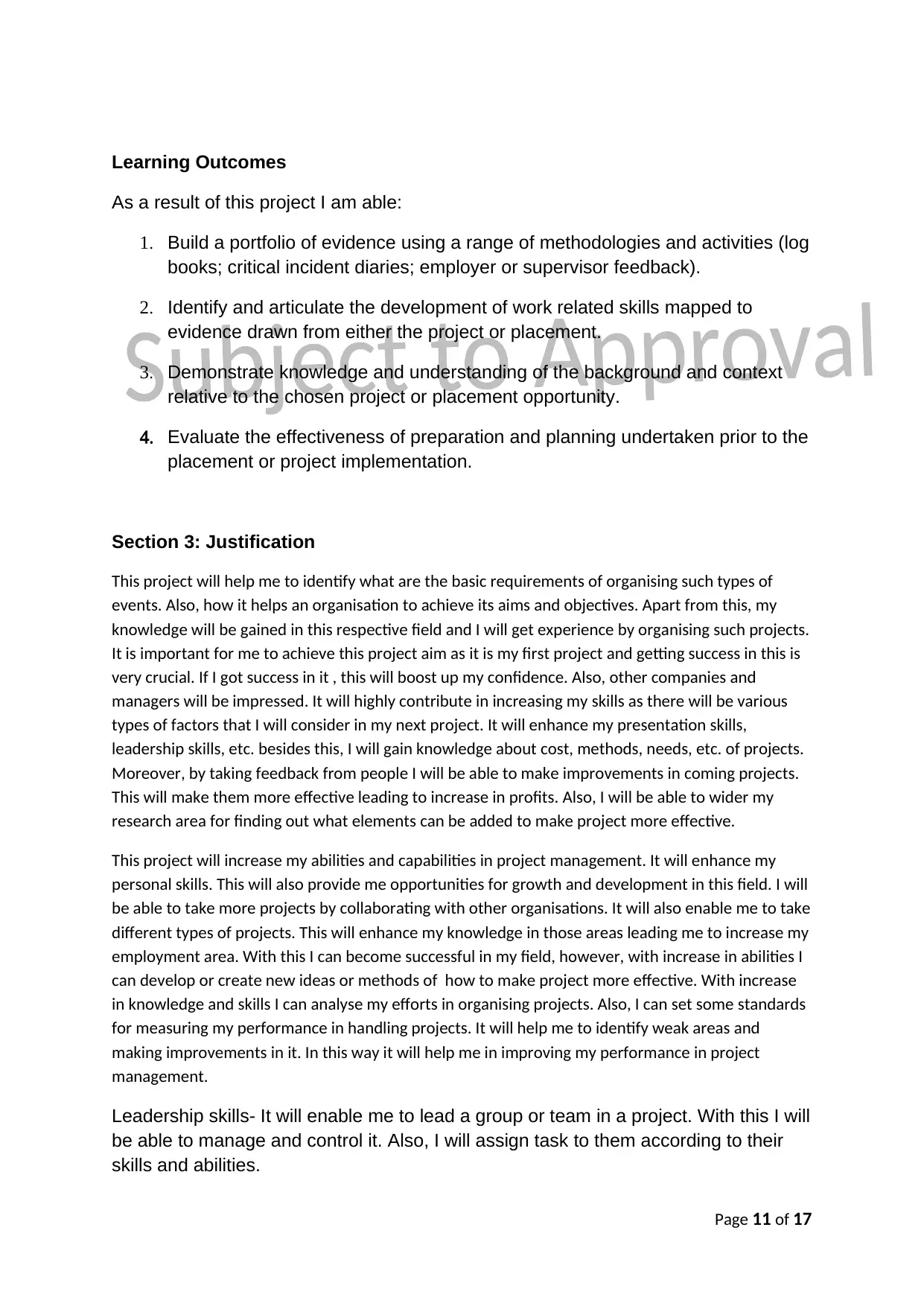
Learning Outcomes
As a result of this project I am able:
1. Build a portfolio of evidence using a range of methodologies and activities (log
books; critical incident diaries; employer or supervisor feedback).
2. Identify and articulate the development of work related skills mapped to
evidence drawn from either the project or placement.
3. Demonstrate knowledge and understanding of the background and context
relative to the chosen project or placement opportunity.
4. Evaluate the effectiveness of preparation and planning undertaken prior to the
placement or project implementation.
Section 3: Justification
This project will help me to identify what are the basic requirements of organising such types of
events. Also, how it helps an organisation to achieve its aims and objectives. Apart from this, my
knowledge will be gained in this respective field and I will get experience by organising such projects.
It is important for me to achieve this project aim as it is my first project and getting success in this is
very crucial. If I got success in it , this will boost up my confidence. Also, other companies and
managers will be impressed. It will highly contribute in increasing my skills as there will be various
types of factors that I will consider in my next project. It will enhance my presentation skills,
leadership skills, etc. besides this, I will gain knowledge about cost, methods, needs, etc. of projects.
Moreover, by taking feedback from people I will be able to make improvements in coming projects.
This will make them more effective leading to increase in profits. Also, I will be able to wider my
research area for finding out what elements can be added to make project more effective.
This project will increase my abilities and capabilities in project management. It will enhance my
personal skills. This will also provide me opportunities for growth and development in this field. I will
be able to take more projects by collaborating with other organisations. It will also enable me to take
different types of projects. This will enhance my knowledge in those areas leading me to increase my
employment area. With this I can become successful in my field, however, with increase in abilities I
can develop or create new ideas or methods of how to make project more effective. With increase
in knowledge and skills I can analyse my efforts in organising projects. Also, I can set some standards
for measuring my performance in handling projects. It will help me to identify weak areas and
making improvements in it. In this way it will help me in improving my performance in project
management.
Leadership skills- It will enable me to lead a group or team in a project. With this I will
be able to manage and control it. Also, I will assign task to them according to their
skills and abilities.
Page 11 of 17
As a result of this project I am able:
1. Build a portfolio of evidence using a range of methodologies and activities (log
books; critical incident diaries; employer or supervisor feedback).
2. Identify and articulate the development of work related skills mapped to
evidence drawn from either the project or placement.
3. Demonstrate knowledge and understanding of the background and context
relative to the chosen project or placement opportunity.
4. Evaluate the effectiveness of preparation and planning undertaken prior to the
placement or project implementation.
Section 3: Justification
This project will help me to identify what are the basic requirements of organising such types of
events. Also, how it helps an organisation to achieve its aims and objectives. Apart from this, my
knowledge will be gained in this respective field and I will get experience by organising such projects.
It is important for me to achieve this project aim as it is my first project and getting success in this is
very crucial. If I got success in it , this will boost up my confidence. Also, other companies and
managers will be impressed. It will highly contribute in increasing my skills as there will be various
types of factors that I will consider in my next project. It will enhance my presentation skills,
leadership skills, etc. besides this, I will gain knowledge about cost, methods, needs, etc. of projects.
Moreover, by taking feedback from people I will be able to make improvements in coming projects.
This will make them more effective leading to increase in profits. Also, I will be able to wider my
research area for finding out what elements can be added to make project more effective.
This project will increase my abilities and capabilities in project management. It will enhance my
personal skills. This will also provide me opportunities for growth and development in this field. I will
be able to take more projects by collaborating with other organisations. It will also enable me to take
different types of projects. This will enhance my knowledge in those areas leading me to increase my
employment area. With this I can become successful in my field, however, with increase in abilities I
can develop or create new ideas or methods of how to make project more effective. With increase
in knowledge and skills I can analyse my efforts in organising projects. Also, I can set some standards
for measuring my performance in handling projects. It will help me to identify weak areas and
making improvements in it. In this way it will help me in improving my performance in project
management.
Leadership skills- It will enable me to lead a group or team in a project. With this I will
be able to manage and control it. Also, I will assign task to them according to their
skills and abilities.
Page 11 of 17
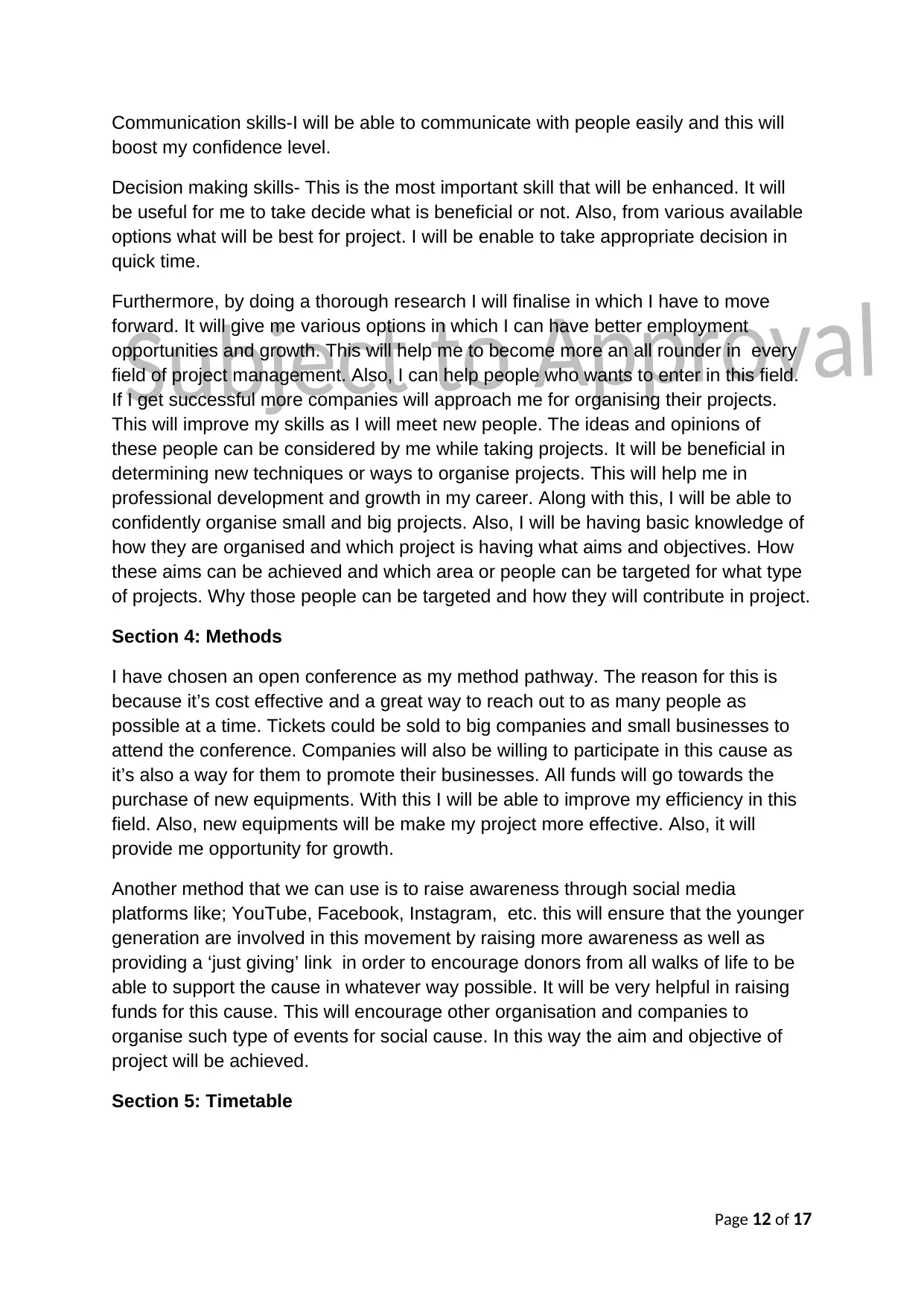
Communication skills-I will be able to communicate with people easily and this will
boost my confidence level.
Decision making skills- This is the most important skill that will be enhanced. It will
be useful for me to take decide what is beneficial or not. Also, from various available
options what will be best for project. I will be enable to take appropriate decision in
quick time.
Furthermore, by doing a thorough research I will finalise in which I have to move
forward. It will give me various options in which I can have better employment
opportunities and growth. This will help me to become more an all rounder in every
field of project management. Also, I can help people who wants to enter in this field.
If I get successful more companies will approach me for organising their projects.
This will improve my skills as I will meet new people. The ideas and opinions of
these people can be considered by me while taking projects. It will be beneficial in
determining new techniques or ways to organise projects. This will help me in
professional development and growth in my career. Along with this, I will be able to
confidently organise small and big projects. Also, I will be having basic knowledge of
how they are organised and which project is having what aims and objectives. How
these aims can be achieved and which area or people can be targeted for what type
of projects. Why those people can be targeted and how they will contribute in project.
Section 4: Methods
I have chosen an open conference as my method pathway. The reason for this is
because it’s cost effective and a great way to reach out to as many people as
possible at a time. Tickets could be sold to big companies and small businesses to
attend the conference. Companies will also be willing to participate in this cause as
it’s also a way for them to promote their businesses. All funds will go towards the
purchase of new equipments. With this I will be able to improve my efficiency in this
field. Also, new equipments will be make my project more effective. Also, it will
provide me opportunity for growth.
Another method that we can use is to raise awareness through social media
platforms like; YouTube, Facebook, Instagram, etc. this will ensure that the younger
generation are involved in this movement by raising more awareness as well as
providing a ‘just giving’ link in order to encourage donors from all walks of life to be
able to support the cause in whatever way possible. It will be very helpful in raising
funds for this cause. This will encourage other organisation and companies to
organise such type of events for social cause. In this way the aim and objective of
project will be achieved.
Section 5: Timetable
Page 12 of 17
boost my confidence level.
Decision making skills- This is the most important skill that will be enhanced. It will
be useful for me to take decide what is beneficial or not. Also, from various available
options what will be best for project. I will be enable to take appropriate decision in
quick time.
Furthermore, by doing a thorough research I will finalise in which I have to move
forward. It will give me various options in which I can have better employment
opportunities and growth. This will help me to become more an all rounder in every
field of project management. Also, I can help people who wants to enter in this field.
If I get successful more companies will approach me for organising their projects.
This will improve my skills as I will meet new people. The ideas and opinions of
these people can be considered by me while taking projects. It will be beneficial in
determining new techniques or ways to organise projects. This will help me in
professional development and growth in my career. Along with this, I will be able to
confidently organise small and big projects. Also, I will be having basic knowledge of
how they are organised and which project is having what aims and objectives. How
these aims can be achieved and which area or people can be targeted for what type
of projects. Why those people can be targeted and how they will contribute in project.
Section 4: Methods
I have chosen an open conference as my method pathway. The reason for this is
because it’s cost effective and a great way to reach out to as many people as
possible at a time. Tickets could be sold to big companies and small businesses to
attend the conference. Companies will also be willing to participate in this cause as
it’s also a way for them to promote their businesses. All funds will go towards the
purchase of new equipments. With this I will be able to improve my efficiency in this
field. Also, new equipments will be make my project more effective. Also, it will
provide me opportunity for growth.
Another method that we can use is to raise awareness through social media
platforms like; YouTube, Facebook, Instagram, etc. this will ensure that the younger
generation are involved in this movement by raising more awareness as well as
providing a ‘just giving’ link in order to encourage donors from all walks of life to be
able to support the cause in whatever way possible. It will be very helpful in raising
funds for this cause. This will encourage other organisation and companies to
organise such type of events for social cause. In this way the aim and objective of
project will be achieved.
Section 5: Timetable
Page 12 of 17
⊘ This is a preview!⊘
Do you want full access?
Subscribe today to unlock all pages.

Trusted by 1+ million students worldwide
1 out of 17
Related Documents
Your All-in-One AI-Powered Toolkit for Academic Success.
+13062052269
info@desklib.com
Available 24*7 on WhatsApp / Email
![[object Object]](/_next/static/media/star-bottom.7253800d.svg)
Unlock your academic potential
Copyright © 2020–2026 A2Z Services. All Rights Reserved. Developed and managed by ZUCOL.





